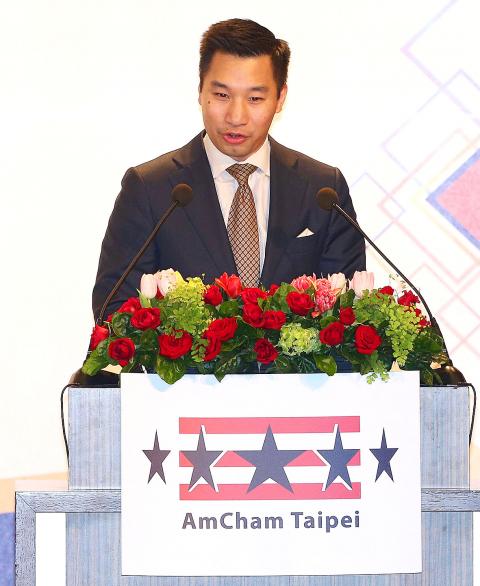A US official on Thursday expressed concern over attempts by China to change the “status quo” across the Taiwan Strait, as seen in Beijing’s escalating efforts to suppress Taiwan internationally.
US Department of State Bureau of East Asian and Pacific Affairs Deputy Assistant Secretary Alex Wong (黃之瀚) pointed to recent actions taken by China to squeeze Taiwan’s international space to make contributions that benefit the international community, such as offering humanitarian assistance and taking part in the World Health Assembly.
“Stability in the region is dependent on the status quo across the Strait. So the US government is very concerned about any attempts to disturb that status quo,” Wong said during a discussion on US strategic competition in the Indo-Pacific region held as part of the annual conference of the Center for a New American Security.

Photo: CNA
Beyond the Taiwan Relations Act, the three US-China communiques and Washington’s “one China” policy, the basis of the US-Taiwan relationship is shared values, a commitment to democracy, a commitment to market economics and a commitment to making positive contributions to the international system, Wong said.
“So in that respect, Taiwan plays a very strong and important role in the Pacific because it’s embodied in the type of reform, the type of value, that we want to promote throughout the Pacific and throughout the world,” he said.
He also mentioned the new office building of the American Institute in Taiwan, which he said is a demonstration of the “enduring nature of our relationship.”
US Principal Assistant Secretary of Defense for Asian and Pacific Security Affairs David Helvey said that Taiwan is a critically important partner of the US and that Washington continues to make available to Taiwan defense articles and services necessary to maintain its self-defense.
Taiwan’s role in the Indo-Pacific region strategy lies in its ability to maintain investment in its own capability to maintain the right type of deterrence and balance across the Taiwan Strait, so it can interact with China in a way that is consistent with its overall approach toward the cross-strait relationship, he said.

Conflict with Taiwan could leave China with “massive economic disruption, catastrophic military losses, significant social unrest, and devastating sanctions,” a US think tank said in a report released on Monday. The German Marshall Fund released a report titled If China Attacks Taiwan: The Consequences for China of “Minor Conflict” and “Major War” Scenarios. The report details the “massive” economic, military, social and international costs to China in the event of a minor conflict or major war with Taiwan, estimating that the Chinese People’s Liberation Army (PLA) could sustain losses of more than half of its active-duty ground forces, including 100,000 troops. Understanding Chinese

The Ministry of Foreign Affairs (MOFA) yesterday said it is closely monitoring developments in Venezuela, and would continue to cooperate with democratic allies and work together for regional and global security, stability, and prosperity. The remarks came after the US on Saturday launched a series of airstrikes in Venezuela and kidnapped Venezuelan President Nicolas Maduro, who was later flown to New York along with his wife. The pair face US charges related to drug trafficking and alleged cooperation with gangs designated as terrorist organizations. Maduro has denied the allegations. The ministry said that it is closely monitoring the political and economic situation

UNRELENTING: China attempted cyberattacks on Taiwan’s critical infrastructure 2.63 million times per day last year, up from 1.23 million in 2023, the NSB said China’s cyberarmy has long engaged in cyberattacks against Taiwan’s critical infrastructure, employing diverse and evolving tactics, the National Security Bureau (NSB) said yesterday, adding that cyberattacks on critical energy infrastructure last year increased 10-fold compared with the previous year. The NSB yesterday released a report titled Analysis on China’s Cyber Threats to Taiwan’s Critical Infrastructure in 2025, outlining the number of cyberattacks, major tactics and hacker groups. Taiwan’s national intelligence community identified a large number of cybersecurity incidents last year, the bureau said in a statement. China’s cyberarmy last year launched an average of 2.63 million intrusion attempts per day targeting Taiwan’s critical

AGING: As of last month, people aged 65 or older accounted for 20.06 percent of the total population and the number of couples who got married fell by 18,685 from 2024 Taiwan has surpassed South Korea as the country least willing to have children, with an annual crude birthrate of 4.62 per 1,000 people, Ministry of the Interior data showed yesterday. The nation was previously ranked the second-lowest country in terms of total fertility rate, or the average number of children a woman has in her lifetime. However, South Korea’s fertility rate began to recover from 2023, with total fertility rate rising from 0.72 and estimated to reach 0.82 to 0.85 by last year, and the crude birthrate projected at 6.7 per 1,000 people. Japan’s crude birthrate was projected to fall below six,